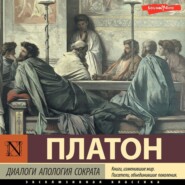По всем вопросам обращайтесь на: info@litportal.ru
(©) 2003-2025.
✖
The Republic
Настройки чтения
Размер шрифта
Высота строк
Поля
Then we must assume a control over the narrators of this class of tales as well as over the others, and beg them not simply to revile but rather to commend the world below, intimating to them that their descriptions are untrue, and will do harm to our future warriors.
That will be our duty, he said.
Then, I said, we shall have to obliterate many obnoxious passages, beginning with the verses,
'I would rather be a serf on the land of a poor and portionless man than rule over all the dead who have come to nought.'
We must also expunge the verse, which tells us how Pluto feared,
'Lest the mansions grim and squalid which the gods abhor should be seen both of mortals and immortals.'
And again: —
'O heavens! verily in the house of Hades there is soul and ghostly form but no mind at all!'
Again of Tiresias: —
'(To him even after death did Persephone grant mind,) that he alone should be wise; but the other souls are flitting shades.'
Again: —
'The soul flying from the limbs had gone to Hades, lamenting her fate, leaving manhood and youth.'
Again: —
'And the soul, with shrilling cry, passed like smoke beneath the earth.'
And, —
'As bats in hollow of mystic cavern, whenever any of them has dropped out of the string and falls from the rock, fly shrilling and cling to one another, so did they with shrilling cry hold together as they moved.'
And we must beg Homer and the other poets not to be angry if we strike out these and similar passages, not because they are unpoetical, or unattractive to the popular ear, but because the greater the poetical charm of them, the less are they meet for the ears of boys and men who are meant to be free, and who should fear slavery more than death.
Undoubtedly.
Also we shall have to reject all the terrible and appalling names which describe the world below – Cocytus and Styx, ghosts under the earth, and sapless shades, and any similar words of which the very mention causes a shudder to pass through the inmost soul of him who hears them. I do not say that these horrible stories may not have a use of some kind; but there is a danger that the nerves of our guardians may be rendered too excitable and effeminate by them.
There is a real danger, he said.
Then we must have no more of them.
True.
Another and a nobler strain must be composed and sung by us.
Clearly.
And shall we proceed to get rid of the weepings and wailings of famous men?
They will go with the rest.
But shall we be right in getting rid of them? Reflect: our principle is that the good man will not consider death terrible to any other good man who is his comrade.
Yes; that is our principle.
And therefore he will not sorrow for his departed friend as though he had suffered anything terrible?
He will not.
Such an one, as we further maintain, is sufficient for himself and his own happiness, and therefore is least in need of other men.
True, he said.
And for this reason the loss of a son or brother, or the deprivation of fortune, is to him of all men least terrible.
Assuredly.
And therefore he will be least likely to lament, and will bear with the greatest equanimity any misfortune of this sort which may befall him.
Yes, he will feel such a misfortune far less than another.
Then we shall be right in getting rid of the lamentations of famous men, and making them over to women (and not even to women who are good for anything), or to men of a baser sort, that those who are being educated by us to be the defenders of their country may scorn to do the like.
That will be very right.
Then we will once more entreat Homer and the other poets not to depict Achilles, who is the son of a goddess, first lying on his side, then on his back, and then on his face; then starting up and sailing in a frenzy along the shores of the barren sea; now taking the sooty ashes in both his hands and pouring them over his head, or weeping and wailing in the various modes which Homer has delineated. Nor should he describe Priam the kinsman of the gods as praying and beseeching,
'Rolling in the dirt, calling each man loudly by his name.'
Still more earnestly will we beg of him at all events not to introduce the gods lamenting and saying,
'Alas! my misery! Alas! that I bore the bravest to my sorrow.'
But if he must introduce the gods, at any rate let him not dare so completely to misrepresent the greatest of the gods, as to make him say —
'O heavens! with my eyes verily I behold a dear friend of mine chased round and round the city, and my heart is sorrowful.'
Or again: —
Woe is me that I am fated to have Sarpedon, dearest of men to me, subdued at the hands of Patroclus the son of Menoetius.'
For if, my sweet Adeimantus, our youth seriously listen to such unworthy representations of the gods, instead of laughing at them as they ought, hardly will any of them deem that he himself, being but a man, can be dishonoured by similar actions; neither will he rebuke any inclination which may arise in his mind to say and do the like. And instead of having any shame or self-control, he will be always whining and lamenting on slight occasions.
Yes, he said, that is most true.
Yes, I replied; but that surely is what ought not to be, as the argument has just proved to us; and by that proof we must abide until it is disproved by a better.
It ought not to be.

















